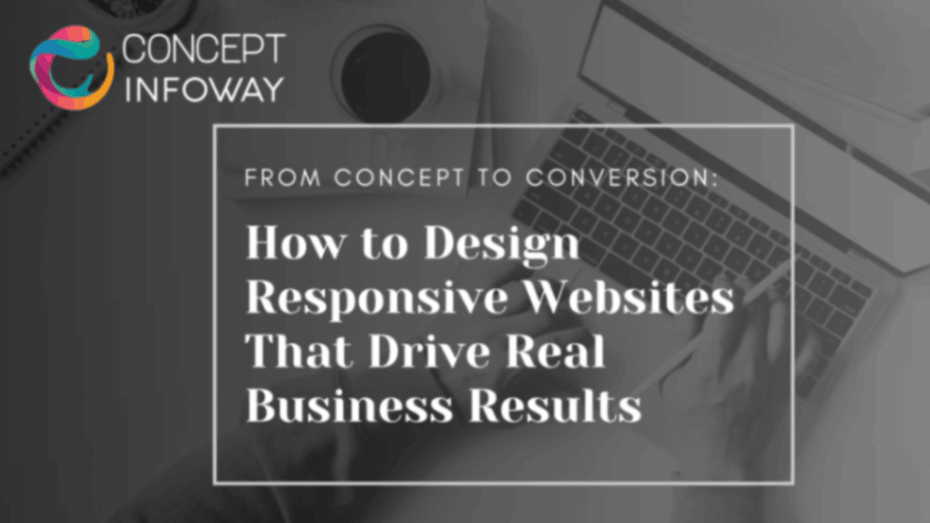
From Concept to Conversion: How to Design Responsive Websites That Drive Real Business Results
In today’s digital landscape, design responsive websites are not merely an option; it’s a critical necessity for any business seeking to thrive. The rapid growth of mobile device usage has fundamentally changed how users access content online. With an ever-expanding array of screen sizes and resolutions, businesses must prioritize their efforts to design responsive websites that offer an optimal viewing experience across all devices.
A responsive website is one that automatically adjusts its layout and content based on the screen size of the device being used. This adaptability is vital because it ensures that users can easily navigate, read, and interact with your website, whether they are on a desktop, tablet, or smartphone. As such, the process to design responsive websites involves more than just making them visually appealing; it requires a thoughtful approach to usability and functionality.
The importance of design responsive websites cannot be overstated. Statistics show that over half of all internet traffic now comes from mobile devices. If your website is not responsive, you risk losing a significant portion of your potential audience. In addition to user experience, responsive design positively impacts your search engine rankings. Google and other search engines favor mobile-friendly websites, making it essential to design responsive websites that meet their criteria.
Moreover, the benefits of design responsive websites extend beyond just aesthetics and SEO. A well-optimized responsive site can lead to higher engagement rates, lower bounce rates, and ultimately increased conversions. When users find it easy to navigate your site and access the information they need, they are more likely to take action—whether that means making a purchase, signing up for a newsletter, or contacting your business.
In this guide, we will delve deep into the methodologies and best practices required to design responsive websites that not only look great but also yield tangible business results. We will cover essential principles, such as fluid grids, flexible images, and media queries, which are foundational to successful responsive design. Additionally, we will explore practical strategies that can help ensure your website performs well across various devices and platforms.
Throughout this discussion, we will emphasize the importance of adopting a user-centric approach when you design responsive websites. Understanding your audience’s needs and behaviors is key to creating a site that resonates with them. By focusing on usability, accessibility, and aesthetics, you can design responsive websites that captivate users and convert them into loyal customers.
Finally, as we navigate through the intricacies of responsive design, we will highlight why collaborating with experienced design responsive website agencies can elevate your project. Their expertise in design responsive websites can be invaluable, ensuring that your site meets the latest industry standards and trends.
In summary, the journey to design responsive websites is both exciting and essential. By prioritizing responsive design, you can create a powerful online presence that not only meets the demands of modern users but also drives real business outcomes. Let’s embark on this journey to discover how to effectively design responsive websites that stand out in today’s competitive digital landscape.
Understanding Responsive Web Design
Responsive web design is an approach that allows a website to adapt seamlessly to different screen sizes and devices. This means that whether a user is on a desktop, tablet, or smartphone, the website will display correctly and provide a user-friendly experience. The core principle of design responsive websites is to ensure that content is accessible, legible, and navigable regardless of the device used.
Importance of Designing Responsive Websites
User Experience (UX): A responsive website enhances user experience, ensuring visitors can easily navigate, read, and interact with content without excessive scrolling or zooming.
SEO Benefits: Search engines like Google favor responsive websites, which can positively impact your rankings. When you design responsive websites, you reduce the risk of duplicate content and improve your site’s load speed—both crucial factors for SEO.
Cost-Effectiveness: Instead of maintaining multiple versions of a website for different devices, a single responsive site simplifies management and reduces costs.
Higher Conversion Rates: A well-designed responsive website can lead to higher conversion rates as users find it easier to complete desired actions, whether it’s making a purchase, signing up for a newsletter, or filling out a contact form.
Key Principles of Designing Responsive Websites
Fluid Grid Layouts
Fluid grid layouts use percentages instead of fixed pixels for sizing elements. This allows components to resize based on the screen size. When designing responsive websites, ensure that your grid adapts to the available space, providing a harmonious layout across devices.
Flexible Images and Media
Images and media should also be responsive. Use CSS techniques to ensure that images scale properly without losing quality or being cut off. Employ the `max-width: 100%` rule to ensure images resize within their containing elements.
Media Queries
Media queries are a fundamental aspect of responsive web design. They allow you to apply different styles based on the device’s characteristics, such as screen size or resolution. When designing responsive websites, strategically use media queries to adjust layouts, typography, and navigation based on the device being used.
Responsive Typography
Text readability is crucial for user experience. Ensure that font sizes are responsive and legible on all devices. Use relative units like `em` or `rem` for font sizes instead of fixed units like pixels to achieve better scalability.
Touch-Friendly Navigation
For mobile users, touch-friendly navigation is essential. Design buttons and links that are easy to tap, ensuring sufficient spacing between them to prevent accidental clicks. A well-structured, responsive navigation menu enhances usability and encourages users to explore more.
Simplified Forms
Forms are a critical element for conversions. When designing responsive websites, simplify forms for mobile users. Use single-column layouts, larger touch targets, and placeholder text to guide users. Minimize the number of fields required to increase submission rates.
Hire Responsive Web Designers?
Get a Free Quote
Best Practices for Designing Responsive Websites
Prioritize Mobile-First Design
A mobile-first approach involves designing for smaller screens before scaling up to larger devices. This ensures that you focus on essential content and features that matter most to mobile users. By prioritizing mobile, you create a solid foundation for your responsive website.
Use a Responsive Framework
Consider using a responsive framework like Bootstrap or Foundation. These frameworks provide pre-built components and grid systems that simplify the process of designing responsive websites, allowing you to focus on customization and functionality.
Optimize Page Speed
Fast-loading websites are crucial for user satisfaction and SEO. Optimize images, minify CSS and JavaScript, and leverage browser caching to ensure your responsive website loads quickly on all devices.
Test Across Devices
Regularly test your responsive website across various devices and screen sizes. Use tools like Google’s Mobile-Friendly Test or browser developer tools to identify any issues and ensure your site provides a consistent experience.
Monitor Analytics
Utilize analytics tools to track user behavior on your responsive website. Analyze metrics such as bounce rate, time on site, and conversion rates to identify areas for improvement and optimize the user journey.
Why Choose Concept LLC for Design Responsive Websites
When selecting a partner to help you design responsive websites, Concept LLC stands out as a leader in the field. Here are compelling reasons to choose us for your responsive web design needs:
Expertise in Responsive Design
With years of experience in designing responsive websites, our team of skilled professionals understands the intricacies of responsive web design. We stay updated on the latest trends and best practices to ensure your website meets the highest standards.
Tailored Solutions
At Concept LLC, we believe that every business is unique. We take the time to understand your brand, target audience, and specific goals. This allows us to create customized responsive web designs that align with your vision and drive real business results.
Data-Driven Approach
Our design process is rooted in data. We conduct thorough research and analysis to inform our design choices, ensuring that every element contributes to improving user experience and conversion rates. By leveraging analytics, we continuously refine our strategies for optimal performance.
Comprehensive Services
Concept LLC offers a full range of services beyond responsive web design. From SEO and content marketing to branding and social media strategy, we provide a holistic approach to digital marketing. This ensures that all aspects of your online presence work together seamlessly.
Commitment to Quality
Quality is central to our mission at Concept LLC. When we design responsive websites, we implement rigorous quality control processes to guarantee that your site is not only visually stunning but also highly functional and user-friendly. Our commitment to excellence ensures that every aspect of your responsive website meets the highest standards.
From the initial concept through to the final launch, our team focuses on creating an exceptional user experience. We understand that a well-designed responsive website must cater to diverse audiences across various devices. That’s why, during the process of designing responsive websites, we conduct thorough testing and review to identify and resolve any potential issues.
Our goal is to consistently exceed your expectations at every stage of the project. By prioritizing quality in our approach to designing responsive websites, we ensure that the result is a seamless blend of aesthetics and functionality. We believe that a successful responsive website should engage users, encourage interaction, and ultimately drive conversions.
In addition, we stay updated on the latest industry trends and best practices to enhance the quality of our responsive designs. Our dedication to quality means we are always looking for ways to innovate and improve. When you choose us to design responsive websites, you can be confident that you are partnering with a team that places a premium on delivering a high-quality product.
In summary, at Concept LLC, quality is not just a checkbox; it’s an integral part of our process. Our unwavering focus on quality ensures that your responsive website stands out in today’s competitive digital landscape, offering both visual appeal and a top-notch user experience.
Ongoing Support and Maintenance
After you launch your responsive website, our commitment doesn’t stop there. At Concept LLC, we offer ongoing maintenance and support to ensure that your site remains updated and fully optimized. The process of designing responsive websites is just the beginning; we understand that the digital landscape is constantly evolving, and your website must adapt to these changes. Our team is dedicated to your long-term success and will collaborate with you to navigate the shifting market conditions.
When you choose us to design responsive websites, you gain a partner invested in the continuous improvement of your online presence. We proactively monitor your site for performance issues and make necessary updates to enhance user experience. Our ongoing support includes regular audits to ensure that your responsive website meets the latest industry standards and best practices for SEO.
Additionally, as technology trends and user behavior change, we’ll work with you to implement new features that keep your website relevant. Our expertise in designing responsive websites means we are well-equipped to help you capitalize on emerging opportunities and ensure that your site remains competitive.
At Concept LLC, we believe that the journey to design responsive websites is a collaborative process. We invite you to engage with us as we continuously optimize and refine your site. Together, we can ensure that your responsive website not only meets current user expectations but also evolves to exceed future demands. Trust us to be your partner in this journey, committed to the ongoing success of your responsive website and your business as a whole.
Proven Track Record
Our portfolio showcases a diverse range of successful projects, demonstrating our ability to design responsive websites that drive real results. We have helped numerous clients improve their online presence, enhance user experience, and achieve higher conversion rates.
Transparent Communication
We value transparency and communication. Throughout the design process, we keep you informed and involved, ensuring that your feedback is incorporated. Our collaborative approach fosters a strong partnership built on trust and shared goals.
Conclusion
Designing responsive websites is essential for businesses looking to thrive in the digital world. By implementing key principles, best practices, and partnering with a reputable agency like Concept LLC, you can create a responsive website that not only looks great but also drives real business results.
With the right design strategy, your responsive website can enhance user experience, improve SEO rankings, and ultimately lead to higher conversion rates. Embrace the power of responsive web design and watch your business flourish in an increasingly mobile-driven marketplace.
Call Us Today!
+1 832 290 9522Frequently Asked Questions – FAQs
Designing a responsive website involves using flexible layouts, scalable images, and CSS media queries to adapt the site to any screen size. Concept Infoway LLC specializes in design responsive websites that ensure smooth user experiences across desktops, tablets, and mobile devices—driving engagement and conversions.
Responsive design is part of both UX (User Experience) and UI (User Interface). It impacts how users interact with the site (UX) and how elements adjust visually (UI). Concept Infoway LLC blends both to design responsive websites that are visually consistent and functionally flawless on every device.
Responsive web design is primarily a front-end practice, focusing on layout and design through HTML, CSS, and JavaScript. Concept Infoway LLC’s front-end developers excel in building responsive websites that look great and perform seamlessly across all device types.
To create a responsive website design, you’ll need to use a flexible grid layout, optimize images and media for different screen sizes, employ CSS media queries, ensure touch optimization, and prioritize fast loading times. Consider using responsive design frameworks and continuously test your website across various devices.
A responsive web design is a website that automatically adjusts its layout and content to fit the screen size of the device being used. This ensures a consistent and optimal user experience across different platforms like desktops, laptops, tablets, and smartphones.
If a website is designed with responsive design, it will automatically adapt to the screen size of the user’s device, providing a better viewing experience and improving user engagement. It can also enhance search engine rankings and boost conversion rates.
Yes, responsive design is still a crucial aspect of web development. With the increasing number of users accessing the internet on mobile devices, having a responsive website is more important than ever. It ensures a positive user experience, improves search engine rankings, and helps businesses reach a wider audience.

